Explaining the Sanders-Warren Flap
Two progressives enter. One progressive leaves.
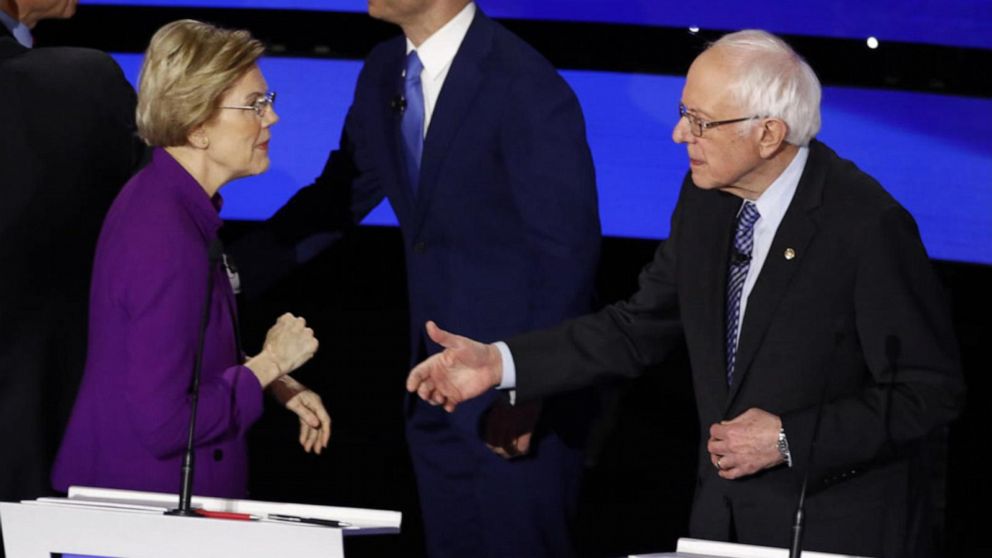
Elizabeth Warren and Bernie Sanders entered the 2020 presidential race as favorites. They’re both leaders of the progressive movement. Their policy preferences are almost identical. While they were going to have to clash at some point, they had been shrewdly been working in tandem in directing fire at more moderate candidates like Joe Biden and Pete Buttigieg. Until last week.
On the day of the most recent Democratic debate, the Warren camp claimed that Sanders had told Warren that a woman could not be elected President. Challenged at the debate, Sanders denied the claim, pointing out numerous instances where he had publicly said the opposite decades earlier. After the debate, Warren refused to shake his hand, pretending that he had called her a liar.
The Nation’s Elie Mystal argues, as have many others, that it’s quite possible that both are telling the truth.
People say hurtful things all the time. Often, they don’t mean it. Language is an imperfect tool for communicating thoughts. But when you are an “other,” when you are a minority or part of a disadvantaged group that has historically been shut out from power, and when the person saying it is a member of an advantaged group, you notice the hurts. You notice them because you always have to assess where the hurtful comment lands on the spectrum between merely inelegant to actively dangerous. Did the person misspeak? Or did the person just accidentally reveal deep antipathy for your kind of people? Or was it something in between?
[…]
I believe Warren heard what she heard. But I also believe Sanders doesn’t remember saying it. Sanders isn’t lying when he said, “I didn’t say it.” Lying requires at least some minimal intent to dissemble or deceive. I believe Sanders is being forthright. He says he didn’t say it because he has no memory of saying such a thing, and it doesn’t sound to him like something he would say. From his perspective, that’s the end of the discussion. He doesn’t remember it, doesn’t agree with it, and so it didn’t happen.
It’s possible that Sanders made an offhand comment that the country isn’t ready to elect a woman and didn’t caveat that he thinks that’s a shame because he assumed that was understood. Regardless, like Mystal, I believe Warren found it hurtful at the time and Sanders thought nothing of it because he’s supported women in politics his entire adult life.
But there’s obviously more to the rift than some offhand comment and hurt feelings.
Jonathan Martin and Sydney Ember, writing for The New York Times, argue it reflects deep fissures in the movement.
A sizable, loud swath of left-wing activists are now furious at Warren for criticizing and challenging Sanders over gender and for employing hardball campaign tactics this week. Meanwhile, some progressive women and backers of Warren are angry at Sanders for disputing her and for not denouncing the #NeverWarren campaign by some of his online supporters.
Both candidates and their advisers have come to believe that the other camp is fighting dirty, according to interviews with campaign officials and surrogates. They have not spoken since their postdebate confrontation in Iowa on Tuesday night, and many liberals are starting to feel a painful sense that they’ve been here before.
The story references the bitterness after 2016, in which some sizable number of Sanders supporters believe they were screwed over by a party establishment that rigged the game in favor of Hillary Clinton and refused to turn support her, perhaps making the difference in putting Donald Trump in the White House. But it’s also reminiscent of 2008, in which upstart Barack Obama narrowly defeated Clinton for a nomination many believed was her due. The resulting PUMA (party unity my ass) movement obviously didn’t cost Obama the presidency but it took quite a time for that resentment to dissipate.
Ill will between Sanders and Warren supporters is now exploding on social media, with angry memes, conspiracy theories and harassing commentary mostly aimed at Warren. Negative attacks and doubts about party unity are exactly what Democratic leaders do not want to happen in 2020, for fear of handing ammunition to Trump, as the heated contest between the Vermont senator and Clinton did four years ago.
Many Warren advisers and allies think the Sanders camp has long tolerated public attacks on her from his surrogates and believe he is not reining in divisive and in some cases sexist attacks against her among Sanders supporters on Twitter.
And the Sanders camp is even more frustrated over what they see as an orchestrated, dayslong campaign by Warren to revive her bid by suggesting Sanders is a misogynist.
While social media was thriving in 2008, Twitter was relatively new and certainly didn’t drive politics in the way it did in 2016 and has in 2020. The news cycle never ends and is less in the control of the candidates than it used to be. And the attacks are meaner, more direct, and more personal. And that makes healing the rift harder than it was in the days of “it’s just politics.”
Compounding matters is the fact that both campaigns represent broader movements that go beyond policy goals:
But even if one of them claims the nomination, the rupture between the two senators could be difficult to repair because of the nature of their two coalitions: If Sanders emerges as the nominee, he may find it difficult to energize the female Democrats who were already uneasy with him because of the 2016 race. And should Warren become the party’s standard-bearer, she could find it hard to win back the most fervent Sanders backers, who hardly needed any further evidence to claim that the nominating process is stacked against him.
Warren has had Sanders’ back for quite some time, deferring to him as the leader of a movement who put bold ideas like Medicare for All in the realm of the possible. She, not unreasonably, thought that, at the ripe old age of 77, would bow out and throw his support to her. He and his supporters, meanwhile, see her as a convert piggybacking on his momentum and trying to deny him a nomination that they, incorrectly, believe should have been his last go-round.
FiveThirtyEight’s Clare Malone also sees identity at work here.
What’s curious, though, is that the rift isn’t over policy particulars. The Warren vs. Sanders progressivism fight seems to be more stylistic, an unexpectedly tense class war of sorts within the broader progressive class war. Should progressive populism be wonky and detail-oriented and appeal to college-educated former Clinton voters? Or a more contentious outsider assault on the powers-that-be from the overlooked millions of the middle and lower-middle class?
—“What The Sanders vs. Warren Battle Is Really About”
One would think the obvious answer would be Yes. There’s no way to win the nomination—much less the White House—without bridging that gap. But Warren and her people think the problem is a with the rules by which the game is played while Sanders and his people think the game itself is the problem.
America is a country whose politics are pheromonal; voters are largely attracted to certain candidates not for their policy positions but for the cut of their jib or the familiarity of the story at the heart of their self-mythology. And among the Sanders-committed, there seemed to be a sense that the candidate’s famous frankness was his greatest asset — and it could well be with certain groups.
Further, Sanders believes Warren is just a repackaged Hillary Clinton:
The other part of the controversial Sanders campaign talking points on Warren was that her supporters — the wealthy, well-educated ones — would already “show up and vote Democratic no matter what … she’s bringing no new bases into the Democratic Party.” At his rallies, Sanders was putting his electability foot forward — supporters waved “Bernie beats Trump” signs while he spoke. In November, The New York Times polled battleground state voters and found that persuadable, white working-class voters had policy views that aligned with some Sanders/Warren proposals, but “by a margin of 84 percent to 9 percent, they say political correctness has gone too far. They say academics and journalists look down on people like them.” Nonwhite persuadable voters supported systemic change candidates and single-payer health care, but 50 percent approve of Trump, a man known for pushing the boundaries of correctness, political or otherwise.
The anti-political-correctness voters and Trump-approvers are perhaps the demographics where Sanders has the greatest chance to make inroads. While his trademark directness isn’t anti-PC, it’s of a sympatico strain, in a way: “I don’t care what you think, I’m going to say and do what I please.” The Sanders brand is based entirely on that slippery, overused quality that politics so prizes: authenticity. He has believed in the same things for decades and advocated for them in the same polemical style. Even his heavy Brooklyn brogue remains unchanged despite his having left the borough in the ’60s. It speaks to being from a place, not a rootless cosmopolitan class
Warren is fundamentally an academic—and a Harvard one at that. And, despite humble origins of her own, that makes her an elite and therefore suspect to Sanders’ people.
While they share so many policy goals, it’s obvious their appeal is somewhat divergent. There is certainly a gap between the demographics of Sanders and Warren supporters. According to FiveThirtyEight/Ipsos polling, conducted using Ipsos’s KnowledgePanel,1 about 34 percent of people considering voting for Warren’s have household incomes of over $125,000, compared to around 22 percent of potential Sanders supporters. And Warren’s potential backers are particularly skewed toward college-educated Democrats, while people considering Sanders and Biden are more evenly distributed across education levels.
There are some interesting graphics showing these disparities and I commend them to your attention. But the bottom line is that, despite offering similar policy ideas, they arrive at them in fundamentally different ways and there’s therefore a deep distrust.
Sanders is not wrong in pointing out that Warren’s populism — and make no mistake, it is that; she does her fair share of billionaire-bashing — has resonated with a different audience than his. In part, it’s because her packaging of populism is meant to extend an ideological hand to the establishment Democratic voters who cottoned to Clinton in 2016 but regretted, perhaps, their inability to see that the country was ravenous for system-busting talk. She scratches the itch of big ‘ole change but understands that the Democratic Party is filled with people who are still comfortable within the system, even if they have intellectual critiques of it.
As someone on the outside of the tent looking in, it’s rather bizarre and frustrating. But it’s understandable, too.
Not surprisingly, I much prefer Warren to Sanders. While I find her annoying at times, she’s fundamentally decent and likable whereas Sanders comes off as a bitter old man. His supporters are not dissimilar to Trump’s and they employ many of the same unseemly tactics online and elsewhere. And, while I think he’s a far better man than Trump, he hasn’t exactly bent over backward to stop the Bernie Bros’ nasty and misogynistic attacks.
I, too, am an academic and am naturally drawn to her wonkishness. Her command of detail and hard-wired tendencies to curiosity and intellectual honesty would serve her well in the White House. His angry bluster and shoot-from-the-hip style, by contrast, are downright Trumpian. Unlike Trump, I think his heart is mostly in the right place. I think he genuinely cares about other people. But governing is about compromise and bringing people with divergent views and backgrounds together. Those are not his strong suits.
But I’m not the target audience. While I’d prefer a Biden or Buttigieg or even a Yang to Warren, I’d vote for her or even Sanders over Trump. And in that sense Sanders is right: he expands the universe of possible Democratic voters in November in a way she does not.
Then again, it’s not obvious whether that’s necessary. Clinton, after all, won three million more votes than Trump in 2016. The stars aligned perfectly for him in that direction, to the surprise of just about everyone. The demographics continue to move in the Democratic direction, as old whites die off and are replaced by younger, Hispanic voters.
Sanders is more likely than Warren to take some of Trump’s disaffected white voters away. But she’d be a better President.
But the rift, and the forces behind it, make it much more likely that Biden will win the nomination despite his weak performances on the stump and in the debates. And may well make it easier for Trump to get re-elected if the losers sit another one out.

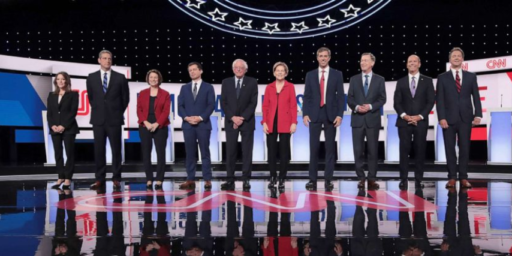
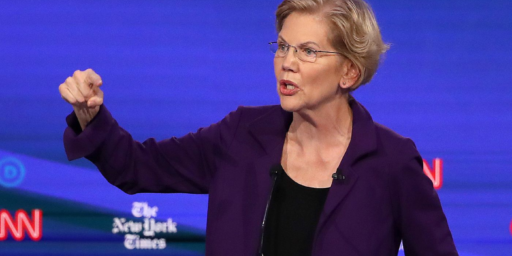
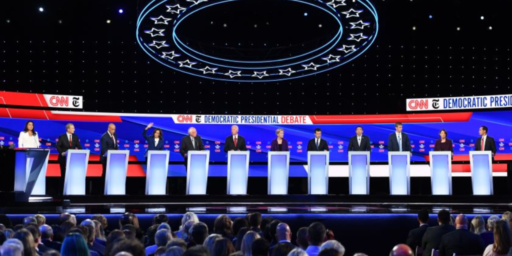
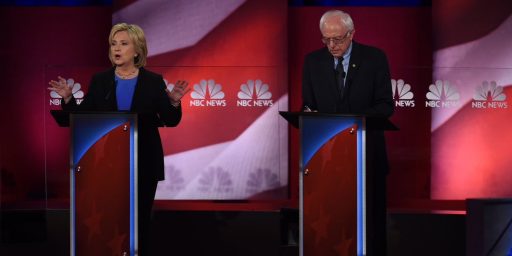

It’s so silly. The last thing Dems need right now is division.
I wonder how much of this “rift” is being magnified by foreign actors on social media seeking more chaos and distrust? I’ve noticed a lot of the accounts pushing it on Twitter are suspiciously bot-like.
It is in the realm of possibility, but it seems very unlikely and, notably, Mystal provides no evidence beyond her “belief” that Warran’s recollection is accurate.
But let’s look a little closer.
Why would anyone in December 2018, much less someone on the left like Bernie, actually think that a woman couldn’t win the Presidency when by all accounts, Clinton should have won in 2016 and would have won had she been slightly more competent? On a purely objective basis, it seems obvious to me that a woman can win based on that alone.
But it would be one thing to privately believe that a woman couldn’t win, but it’s something else to speak that out loud in today’s environment, much less to a future female candidate. Yes it’s possible this happened, but it defies logic in my view.
And it doesn’t speak well to Warren’s credibility that her surrogates deployed this allegation right before the last debate – a clearly self-interested move to buoy her sagging poll numbers. Which is perfectly fine – politics is a rough sport – but leaking unverifiable and questionable allegations for political advantage doesn’t increase the credibility of those accusations.
And just to be clear, I’m not a Bernie Bro. I don’t like Sanders and would never vote for him, but Warren’s allegation seems to be much less credible than alternative explanations.
Secondly, I do think there are currently two primary axes in US politics – the right-left axis and the elite – populist axis. In my view, many on the elite end of the spectrum still underestimate the anti-elite forces in this country and refuse to understand their concerns in a serious way.
I’m not sure who among Democrats can best bridge the populist – elite divide but I’m pretty sure it’s neither Warren or Sanders.
@Jax:
To ask the question is to answer it, it’s an opportunity, of course it will be exploited.
I won’t go through all the gripes I have about Bernie, but the guy is all hat, no cattle. Much talk, minimal accomplishment. Comey would not have been able to throw the election without Bernie’s prep work.
I think this post gets the causation wrong. The first action in their feud was not Warren’s claim that Sanders said that a woman could not be elected President. It was the leaking of the Sanders’ campaign talking points attacking Warren, which only gets mentioned in passing about 2/3rds of the way down the post.
That said, I am coming to the conclusion that, much as I prefer their positions, neither Warren nor Sanders should be the Democratic nominee. This is too important an election to nominate anyone but the person most likely to win by putting together the broadest coalition possible. Biden for 4 years, even if little is done, is far better than another 4 years of Trump, where far too much damage will be done.
Biden’s been stepping his game up a bit, lately. Seems like he finally woke up. I sympathize. He’s an old guy and getting yourself excited* takes a bit longer in old age.
*Double-entendre acknowledged but not encouraged.
@Michael Reynolds:
Something got a rise out of him.
@Jax:
How much is this being magnified by the supposedly liberal MSM because they need conflict and they love ‘Dems in disarray’ stories?
@Michael Reynolds:
*His formerly flaccid campaign is now rising, and getting firmer, hoping for a strong explosion in Iowa.
Feel free to downvote. I need a shower.
I believe Warren. Sanders is, for all his “fight for principle and not politics” personna, a really political and tactical guy (for himself at least, not for the party). He’s also prone to blurting out things without thinking or checking. Remember when he thought incorrectly that Hilary said he lacked qualifications and said “I’m not qualified? SHE’S not qualified.” I can totally see them sitting down and he says something about how uphill a battle it is for a woman and takes it too far.
Now rationally, HRC got 3 million more votes. But she lost the election, and that is what Bernie would remember in the moment.
Regarding the potential Dem nominee, I’m in the anybody but Bernie camp. Yes I’ll vote for him if he is the nominee, Trump needs to go, but I’d be tempted to leave that line blank if it were a different Rethug.
@Andy:
I’m sure that this is my bias, but I completely think that Sanders could have said this — or probably a formulation more along the lines of “cannot beat Trump.” I think a lot of that is that he’s convinced that he’s the *only* person who can. I also think all of what you cited can also be reframed as an argument that — in his mind — he’s right (I’m sure he thinks that if he had gotten the nomination in 2016 he’d be the president).
(He also sees himself as apparently the only person who can really articulate a progressive message on that stage — despite still not being a Democrat.)
Generally speaking, this was bound to happened sooner or later with Warren and Biden given that neither one has broken away with the progressive wing (which ultimately may be the best thing that happens for whatever candidate eventually wins the nod).
I think that this is a really useful way of thinking about things. Thanks for sharing!
@Pylon:
This thread reminded me of this Post story from 16, where Barney Frank dissed Bernie.
https://www.washingtonpost.com/news/the-fix/wp/2016/04/06/the-case-against-bernie-sanders-according-to-barney-frank/
@EddieInCA:
By now, Biden is a hardened campaigner.
The fight is moot, but the chattering class doesn’t know it yet.
https://www.focusonruralamerica.com/2020/01/20/january-poll-results/
https://projects.fivethirtyeight.com/polls/president-primary-d/iowa/
Trends matter.
@Andy:
That. People, by which I mostly mean the MSM, don’t seem to quite recognize the extent to which Trump, a New York (said as in the hot sauce commercials) billionaire, succeeded by running against the elite. He relied on the spade work done by GOPs and RW media in changing “elite” from meaning rich and powerful to something completely different, but he nonetheless ran against the failings of the elite, the rich and powerful elite.
Dems are the natural home for this resentment against the elites, but I fear it’s easy for GOPs to use it to energize racism. It’s not Charles Koch who’s taking your money, it’s some black guy or an immigrant. It’s hard for Ds to mobilize resentment against billionaires because they need donations from billionaires.
I recommend Chris Hayes’ Twilight of the Elites. I see little evidence they’re twilighting, but he does catalog their list of failures; failed wars, economic crisis, infrastructure, failure to address AGW, etc.
The real major issues do fall out on an elite/populist axis: global warming, wealth inequality, the Middle East, democracy. The trick is to get the merely wealthy, the 1%, to recognize their interests align against the .01%. And that’s a really hard trick.
The unpleasant fact is, it is harder for a woman to win. In Identity Crisis, Sides et al say gender did cost Hillary in ‘16. IIRC they declined to put a number on it, but felt there was a clear effect. Surely women voting for Hillary because of gender outweighs men voting against? Per Sides et al, gender identification is a much weaker part of self identity for women than traditional male is to men.
Was it enough to make up the famous 70,000 votes? Can’t be sure, but 70,000 spread over three states?
Did Bernie say it to Warren? How would I know? Would it be a commonplace of conventional wisdom that Bernie would forget saying? Easily. Is it more likely that a woman would remember the remark? Yeah.
@CSK: Points for speed.
The best possible outcome is that Bernie gets eliminated by the 15% rule in much of Iowa and comes in third or fourth and then goes on to third or fourth in NH. He will lash out and do as much damage as he can to the Democratic front runners so it is best if it happens early and they have time to recover from it.
@Sleeping Dog: That article sums up my view of Bernie perfectly. It’s captured right at the top:
@EddieInCA: “The fight is moot, but the chattering class doesn’t know it yet.”
Maybe we could wait until one vote is actually counted before we start declaring any fights moot…
@MarkedMan:
That’s why they pay me the big bucks.
@CSK:
“By now, Biden is a hardened campaigner.”
But Biden faces stiff competition.
@Moosebreath:
He has wooden resolve.
@mattbernius:
You make a good point about ego. And there is also the argument that Bernie may have misspoken or that it was a gaffe or perhaps a calculated lie. But ultimately we don’t know. And we also don’t know what Bernie actually believes since we can’t see into his mind, so that is speculation too. So my own speculation is likely not better than anyone else.
So I’ll rescind most of my argument and just note that I find it difficult to comprehend that there might be national politicians that actually believe a woman can’t win the presidency.
@gVOR08:
I’m not so sure the Dems are the natural home – at least not anymore. All the candidates are more on the elite/establishment side except for Sanders and he’s not even a Democrat. Warren is part and parcel of the elite, but does at least have more populist policies.
One thing I’ve noted before here is the 5-6 million people who voted for Obama in 2012 and then voted for Trump in 2016. One common thread among this cohort was opposition to the status quo. A lot of them appear to be midwestern whites without a college education who have more liberal economic views and more conservative social views, especially on immigration. I’m not sure what Democratic candidate would best appeal to this demographic, if any.
Is not Sanders part of the elite himself?
It would be so nice to have a president like that again!
Certainly much more so than the Republican party…sure Trump makes populist noises, but at the end of the day, it’s the fat cats that control the GOP…
But I thought all Trump supporters were racist cultists?
Oh well.
I’ll grant you that Warren is definitely a “gifted storyteller.” NYT got that right.
@Jax:
Oh. My. God.
Just.
Stop.
Talk about a cult…
You’re confused, so let me help you out…not everyone who supports Trump is a racist or a cultist…but, Trump himself is definitely a racist, so if you still support him, you are supporting a racist…and there are plenty of people who support him because they like their tax cuts, and/or they like all the conservative judges he’s been a part of ramming through and/or they like the political power he enables them to have, but there are plenty of people who support him even though he does things or agrees with things that hurt them…such people exhibit many of the signs of being part of a cult…
Surely you do realize that foreign actors have and will use social media for purposes of manipulation? Perhaps you are too obtuse to understand that or you’re just a liar who doesn’t want to admit anything that might tarnish Trump…
@Sleeping Dog: I hold to Franks’ view.